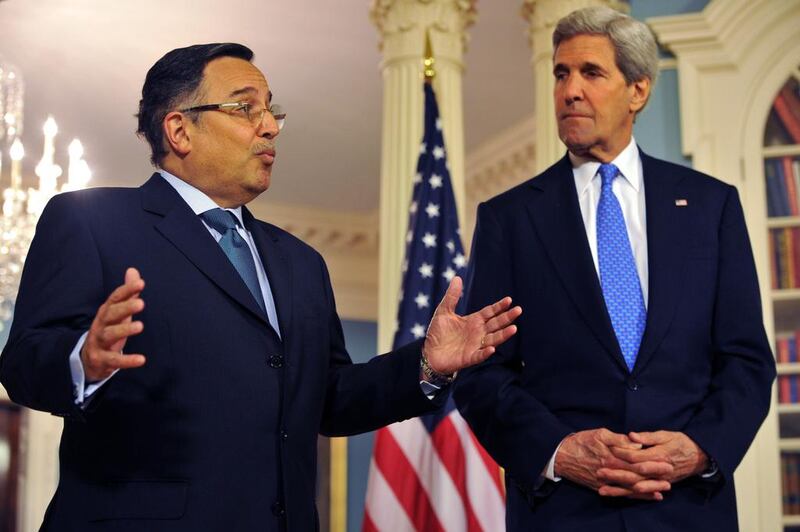NEW YORK // Growing disagreement between Congress and the Obama administration threatens to undermine Washington’s recent attempt to stabilise relations with Cairo, as a key senator blocked the request to release a significant portion of suspended Egyptian military aid.
Senator Patrick Leahy, a senior Democrat who heads the subcommittee that controls the purse strings of foreign aid, put a hold on the State Department’s request to deliver $650 million in suspended military assistance, citing the recent death sentences given to hundreds of Muslim Brotherhood members and supporters.
“It’s an appalling abuse of the justice system, which is fundamental to any democracy,” Mr Leahy said in remarks given from the Senate floor on Tuesday. “I am not prepared to sign off on the delivery of additional aid to the Egyptian military … until we see convincing evidence that the government is committed to the rule of law.”
Mr Leahy’s decision came shortly after legislators from both parties in a House foreign affairs subcommittee hearing denounced the decision to move forward with the aid, putting a question mark on the future of the $1.5 billion the US has given to Egypt annually since the 1980s, mostly through arms contracts to US manufacturers.
The announcement came during Egyptian Foreign Minister Nabil Fahmy’s visit to the State Department and as senior US military officials met with their counterparts in Cairo, and could undermine the US administration’s efforts to stabilise a relationship that Mr Fahmy described as “eroded”.
The Obama administration has been deeply divided about how to approach its relationship with the Egyptian military since it removed the Muslim Brotherhood-backed former president, Mohammed Morsi, from power last July and suspended aid as well as scheduled shipments of Apache attack helicopters and eight F-16 jets.
The State Department and Pentagon favoured maintaining the aid because of Egypt’s strategic importance to US policy in the Middle East, while the White House decided that it could not legally move forward.
In January, Congress appropriated the usual $1.5 billion but placed conditions on its delivery, stating that the administration must certify that Egypt is abiding by its peace treaty with Israel, maintaining the strategic relationship with Washington as well as making progress in its democratic transition and respecting human rights.
Last week, it seemed that the administration was finally on the same page regarding Egypt, and Secretary of State John Kerry announced that he had certified that Cairo was meeting the first set of benchmarks, and that the Apache helicopters as well as $650 million in military aid would be delivered.
But many from both parties in Congress feel that Mr Obama’s Egypt policy is contradictory and has yet to coherently address their concerns about human rights and Egypt’s political transition.
“The administration has been speaking out of two sides of its mouth,” said Eric Trager, a fellow at the Washington Institute for Near East Policy think tank. “And this confusion from the administration is costing it credibility on the Hill, so now you’re seeing [Congress] act more unilaterally because it is really very concerned with Egypt’s trajectory, and it [also] doesn’t trust the administration.”
Washington, Mr Trager said, has been unable to effectively communicate, both between its various agencies and with Congress, “how we can both maintain a strategic relationship with Egypt while encouraging it to move in a more progressive direction”.
The disarray in Washington is not likely to sever the close ties between the two countries’ militaries that relies on shared core interests, but it may be causing Egypt’s military rulers to question the depth of the relationship.
“The way the military sees it, we are fighting terrorists in the Sinai, we are maintaining the peace treaty with Israel, we are giving overflight rights to US planes, we are giving preferred access to the Suez Canal for US ships — why does Washington seem to be prioritising a domestic political fight [in Egypt] over its strategic interests?” Mr Trager said.
In Egypt, Mr Obama’s policies may seem to be part of a unified strategy, even one that seeks to downgrade bilateral ties, but this reading misses the “fact that [Egypt policy] is more often the outcome of deep internal discord and indecision at the top”, Mr Trager said.
Perhaps intending to send a message to Congress at a time when Washington is embroiled in a dispute with Moscow over Ukraine, Mr Fahmy said at a talk in Washington on Tuesday that Egypt is looking to “diversify its portfolio of strategic and economic relationships”, adding that “our emerging relationship with Russia is one that we will seek to nurture and leverage”.
tkhan@thenational.ae





